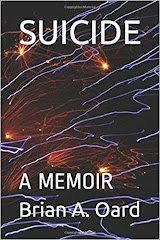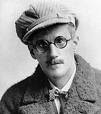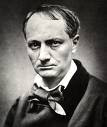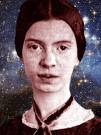I'm beginning this Bloomsday month with a quick re-reading of the Joycean Telemachiad, the first three chapters of Ulysses, a book I've read cover to cover seven or eight times. (Yes, I've lost count.) The point of these posts isn't to offer any 'universal' interpretation of the novel or its episodes (Ulysses dissolves all interpretations like a universal solvent, anyway). Rather, I want to shine some light on a few passages and ideas that may not have received sufficient attention in the voluminous critical literature...
The first words of Ulysses are too familiar, so let's look closely at them until they become strange again. "Stately, plump Buck Mulligan came from the stairhead..." The elevated, formal connotations of 'stately' are rammed immediately, with only a comma's mini-pause, into the low-comic, ironically deflationary connotations of 'plump.' (The deflation is ironic because the word's literal meaning is an opposite of 'deflated.') Read the words aloud and you can hear the deflation: 'stately' slides smoothly off the tongue through slightly parted lips; 'plump' pops and snaps and rumbles flabbily as it climbs laboriously out of the mouth. Here, in the book's initiating moment of differential meaning, its first two words, Joyce simultaneously demonstrates the deflationary irony that will be the keystone of the novel's comic rhetoric and gives us a crucial lesson in how to read Ulysses. We must take nothing, not a single word, at face value; we must always look for the deflating irony that inevitably lurks somewhere nearby.
Every time I re-read Ulysses I'm amazed anew at the number of major themes Joyce is able to introduce, with seeming effortlessness, in the brief space of the first chapter. Most of the novel's themes and motifs and many of its techniques are either stated or foreshadowed here: a haunting familial death (Stephen's mother here 'containing' the theme that Bloom splits between his father and son), anti-semitism (in Haines's late anti-Jewish aside), cultural imperialism (Haines's plundering of Irish folk culture), imperialism and/as the nightmare of history (Haines again: "history is to blame"), Oscar Wilde as/and the specter of homosexuality (Wilde, dead only a few years before the first Bloomsday, stands alongside Parnell as one of the novel's most important ghosts; note also Buck Mulligan campily calling Stephen "my love"), Catholicism (in Buck's comic blasphemies and Stephen's melancholy pronouncements), fathers and sons (in the teasing preview of Stephen's discourse on Hamlet and in Mulligan's "Ballad of Joking Jesus": "my father's a bird," an image that unites the dove of the Holy Spirit and the winged phallus of classical art while also saying, less exaltedly, "my dad's a dick."), the classical and Mediterranean worlds (Buck's Wilde-ish Hellenism), and much more. The whole novel is contained in embryo in this first chapter. Subsequent chapters will perform acts of cellular division and gargantuan multiplication upon the various parts of the fetal body here formed.
Homer's Odyssey and Shakespeare's plays are the most important intertexts in Joyce's radically intertextual novel. The relationship to Homer is well-known after 90 years of exhaustive exegesis, and I've long considered it less important than the novel's profound and multifaceted intertextual relationship to the plays of Shakespeare. If Homer is the skeleton of Ulysses, Shakespeare is its central nervous system. I'll have more to say about this (someday) in an eventual post on "Scylla and Charybdis," so for now I'll limit myself to a general thought on the allusions of Ulysses. The densely woven allusionary texture of this novel (exemplified in "Telemachus" by allusions to Shakespeare, Xenephon, the writings of the Church Fathers, Yeats, Wilde, Swinburne, and many, many others) is the literary culmination of that distinctively Modernist rhetoric developed decades earlier in the studio of Edouard Manet. My favorite place and time for the birth of Modernism is Paris in the spring of 1863. While Salon-goers crowded in to mock Manet's Dejeuner sur l'Herbe (Luncheon on the Grass) at the Salon des Refuses, the artist was across town working on Olympia. These two seminal paintings were built around a texture of knowing allusions to the history of art, allusions that both deflated the authority of tradition by positioning it amidst mundane modernity and deflated the modern by juxtaposing it with older, more 'heroic' forms. Manet should thus be recognized as the inventor of the technique of mutually deflationary allusion that lies at the heart of the rhetoric of literary modernism: Ulysses, The Waste Land, Mrs. Dalloway, Pound's Cantos, and all the libraries of works that have flowed from them. Manet is the father of Modernism; his model Victorine Meurent might be considered its mother. (Some readers might say that this form of allusion elevates rather than deflates, granting the tradition the immediacy of modernity and raising modernity into the heroic realm. There is a name for such readers: optimists.)
Wednesday, June 1, 2011
Subscribe to:
Post Comments (Atom)










No comments:
Post a Comment